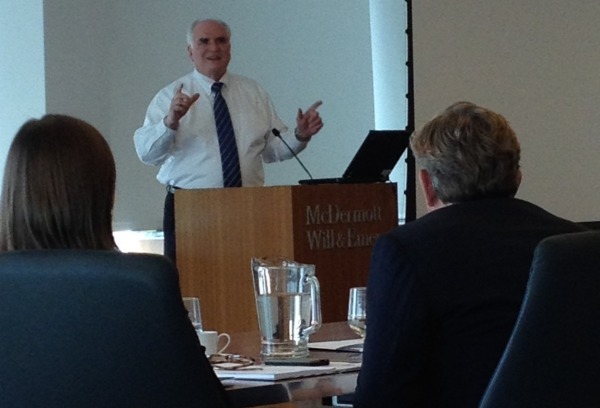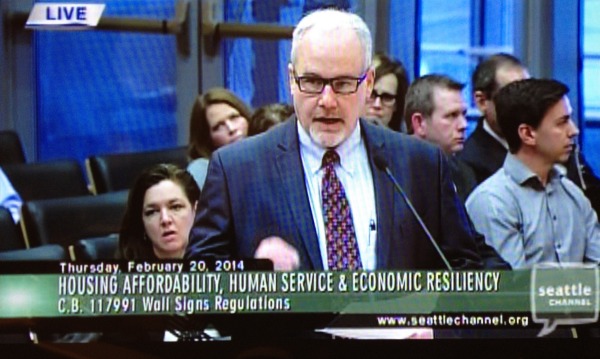It's Time to Save the Washington State Film Office
Our former chair of Government Affairs, George Riddell, continues to keep a vigilant eye on how government policy affects our industry. Perhaps the most vital aspect is when jobs and the broader economy are threatened.
George most recently pointed out our lack of competitive incentives to bring film work to Washington. This month his cry is more dire: Not only are 100% of the incentives not scheduled for renewal. but the Washington State Film Office itself will be closed if funding is not approved by our legislature.
Anybody who works in advertising, corporate marketing, public relations, local media, or anybody with an interest in maintaining a healthy creative ecosystem in Washington should be alarmed.
Read the full text of George's post on the Keep Film Local blog.
We can directly influence the outcome of this decision by contacting our local state lawmakers. Current information on our resources page. You can also go to the state directory for more information.
The vote is June 30th. Your action is needed!
ACT TODAY before it's too late!
Make Washington Competitive
Photo credit: The Walking Dead, AMC Network
Georgia Did It. Why Not Us?
By George Riddell
A recent article in Adweek—Georgia’s TV and Film Industry Now Brings in $7 Billion a Year, Fueled by Smart Incentives—shares some envy-inducing news:
"245 film and TV productions were shot in Georgia during fiscal year 2016.... Those productions spent $2.02 billion during that time and generated an economic impact of $7.2 billion."
"The film and television industry is responsible for more than 85,300 jobs and nearly $4.2 billion in total wages in Georgia."
Georgia's ROI is less than half of Washington's proven return, which has been 10:1 for the past 7 years. And Washington State legislators won't pass film incentives worth even a tiny fraction of Georgia's. The potential for Washington state is huge—in economic stimulus, jobs, tourism, tax revenue and more. But short-sighted lawmakers can't see it.
This year, the state's current motion picture program is scheduled to end unless Washington lawmakers change their tune.
Want to help? Call your state representative or state senator and ask them to support the Washington Motion Picture Competitiveness Program. It's that simple.
Advertising Is Under Attack
Jim Davidson, Executive Director of the Advertising Coalition, speaks to the attendees at the American Advertising Federation "Advocacy and Action: Day On The Hill" in Washington DC. The Advertising Coalition is an organization comprised of eight national trade organizations, representing advertising, broadcasting and publishing industries.
By George Riddell
Imagine if every one of your agency’s clients were suddenly forced to pay taxes on all advertising expenses which, for the past 100 years, have been fully deductible under approved US tax policies. Do you think that might affect the decisions those clients make about advertising? Like budgets? Might those decisions affect your agency’s business? Maybe your livelihood? The answers to all these questions are likely to be yes. There is one proposal under consideration in Washington DC that could have devastating effects on the advertising industry and the general US economy as well.
This was the main topic of discussion this week as the American Advertising Federation hosted an important meeting in Washington DC. Advocacy In Action: Advertising Day on the Hill is the annual event that brings many of the AAF’s 200 ad clubs from around the country together to demonstrate to lawmakers the power and passion of the advertising industry’s grassroots network. I was on hand representing AAF Seattle and the Washington ad industry, and also to brief the staff of US Senator Patty Murray on this issue.
Former US Congressmen Martin Frost (D-TX) and Kenny Hulshof (R-MO) speak to attendees Wednesday. The former lawmakers gave valuable insight into the history of American tax law and current draft legislation that threatens the advertising industry.
This year, the advertising industry faces potentially devastating consequences from proposed tax reform legislation being considered in both the US House of Representatives and US Senate. A key element of both the House and Senate versions would significantly alter the long-standing provision of America’s tax code that allows US businesses to take a standard tax deduction of all current advertising expenses, which have been classified as “an ordinary and necessary business expense” since 1913 (1). So-called “pro-growth” tax reform drafts in the House and Senate include proposals which drastically alter that deduction, essentially constituting a tax on advertising.
Rep. Mike Kelly (R-PA) as he spoke to AAF members on Wednesday. Rep. Kelly is a member of the House Ways and Means Committee, which is currently drafting tax reform legislation.
This measure will also harm the general US economy. Nationally, advertising supports 21.1 million jobs and drives nearly $5.8 trillion in US economic output (3). In Washington alone, advertising helps support nearly a half million jobs (2). Instead of growing the American economy and simplifying the tax code, the passage of this legislation will only slow growth, by causing the loss of millions of jobs nationwide and reducing consumer spending by billions of dollars.
To influence lawmaking decisions in Congress, write your US Representative and Senators and send the following message regarding current tax reform legislation:
The deduction for advertising costs is the correct tax policy. Advertising should remain fully deductible as an ordinary and necessary business expense.
References:
(1) AAF Statement on Advertising Deductibility
AAF Seattle Supports Signage
George Riddell in front of the Seattle City Council - 2/20/2014
By George Riddell
On Feb 20, I represented AAF Seattle and joined with several dozen Seattle business owners and executives at City Hall to testify in opposition to a City Council proposal that, if passed will impose strict limits on the allowable sizes of on-premise signage. An “on-premise” sign is one which advertises the goods, services or products available on the site where the sign is located. Well-known examples of such signs in Seattle are the giant Nutcracker sign mounted each year by Pacific Northwest Ballet and any number of team player likenesses on Safeco Field and Century Link Field.
To be clear, the proposed ordinance is concerned with controlling new signage, and has made allowances for “grandfathering” of existing signage. However, many businesses rely on the ability to change, modify or rotate signs as needed. And this proposed legislation could eliminate that ability. In addition, as with any advertising, keeping the brand messaging current is key. Yet another reason why businesses need the ability to change their signage. However, the overall impact of the proposed change to the signage ordinance will greatly restrict the ability for businesses to use their own premises to promote, market and advertise their brand, products and services.
Despite the outspoken opposition to this proposal by representatives of many arts organizations, sports teams and even members of the originating City Council committee, Sally Clark, chairperson of the committee (Housing Affordability, Human Services and Economic Resiliency) has forwarded this measure to the full council for a vote on March 20.
AAF Seattle continues its opposition to the measure, and encourages others in the advertising industry to register your opposition with your Seattle City Council representative.






